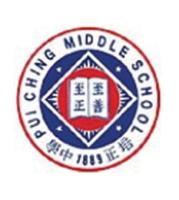| Language Policy |
To increase teaching and learning effectiveness, the school adopts Chinese as the medium of instruction. Cantonese is used in most lessons. However, we have never undermined the importance of English. Pui Ching adopts an advanced English curriculum so that students would have better education and career prospects. Each 3 regular classes are divided into elite, intermediate and/or remedial classes and are taught by 4 teachers. Besides, English textbooks are used in the subjects of Mathematics, Science, and Information Technology so as to equip students with the skills to process English reference materials, so that they can learn better via the Internet. |
| Learning and Teaching Strategies |
Students are encouraged to learn how to learn and to learn actively with the help of IT. The school makes use of the information highway to usher students into the digital learning environment. We also try to create a learner-centred school setting by organising project learning and interdisciplinary learning schemes, so as to allow space for students to think and develop creativity. In order to develop students' reading interest and habit, the school launches extensive reading schemes for the Chinese and English subjects respectively. From S.1 to S.3, all subjects are compulsory so as to lay a good foundation for students. There will be various elite classes in different KLAs for the more capable students. |
| School-based curriculum |
1. Electives: 2X and 3X. The school provides students with Mathematics Extended Part Module 1 and Module 2 as electives.<br> 2. Curriculum highlights: The school provides a wider spectrum of courses in the core discipline and elective subjects. S.4 students can select up to three elective subjects and extended Mathematics module, while S.5 and S.6 students can select two or three elective subjects and extended Mathematics module for Hong Kong Diploma of Secondary Education. |
| Approach to Catering for Learner Diversity |
The school provides individual assessments for students with special physical and psychological needs. Academic streaming is adopted to cater to students' varying levels of ability (e.g. Chinese language, English language, speech, debate, Mathematics, Information Technology, Physics, Chemistry, Science, etc.). To assist the learning of weaker students, they are assigned to remedial classes. |
| Approach to Integrated Education |
From 2019/20, the school has designated a SENCO to lead the Student Support Team. The Team includes the Counselling Master / Mistress, the Prefect of Studies, SENTs, social workers, educational psychologists and representatives from Chinese, English and Mathematics Departments. The school will provide students with different on-campus and off-campus support services based on professional assessment reports.<br>The school will also hold case meetings for students with special needs to explain the needs of the students to teachers and parents, undergo negotiations and follow up the relevant cases. The team will work closely with the subject departments and the class teachers to support those in need.<br>The school will use the Learning Support Grant to hire a number of professional services (e.g. speech therapy, clinical psychological services). Interest classes are held to let students make more friends, boost their confidence and relieve their stress. SENTs organise Chinese and English subject study groups for weaker students from different forms to provide them with extra learning. The Support Team will also help to develop individual study plans for students in need, and if they are assessed to be eligible for special examination arrangements, the school will not only provide internal adjustments but help to apply for public exam adjustments. <br>All reports will be filed by the Team and the information will be kept confidential and restricted to relevant persons. The school will encourage and nominate suitable teachers to participate in relevant training courses as recommended by EDB.<br>The school has established its own communication mechanism to discuss and review the strategies for supporting students through means such as meetings with parents and telephone call |
| Education Support for Non-Chinese Speaking (NCS) Students |
|
| Home-School Co-operation |
The Parents-Teachers' Association (PTA) constantly holds talks and activities to facilitate communication and cooperation between parents and the school as well as to equip parents with skills to teach their children in an effective way. |
| School Ethos |
Life Education: In order to develop students into self-disciplined, respectful individuals, the school insists on life education, which makes use of disciplinary strategies followed by moral teachings. Whole-person Education: The school encourages student development in moral, intellectual, physical, social, aesthetic, and spiritual domains. |
| School Development Plan |
The school seeks to build up an active English learning environment. We encourage students to communicate in English outside class to develop listening and oral skills. Students also have the opportunity to interact with native English-speaking students on the Internet with online projects. In junior forms, the school will continue the "Life Education Project" to empower students with correct moral values. |
| Teacher Professional Training and Development |
To improve teaching quality, the school arranges a staff development day yearly. There are also monthly whole-staff meetings in which talks by professionals or interactive activities are held. |
| Life-wide Learning |
There are more than 50 extra-curricular organisations or groups in the school, including religious groups, academic groups, interests clubs, music societies, sports teams, social service groups and student societies, etc. Students may participate in any of them based on their interests and desires. |
